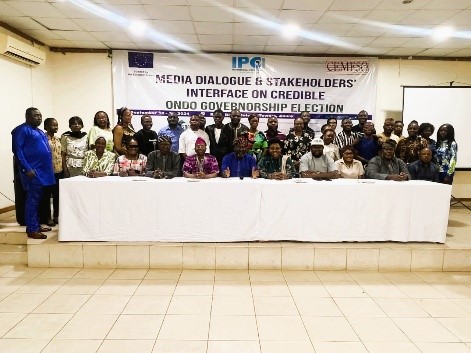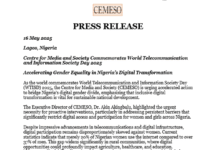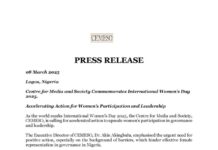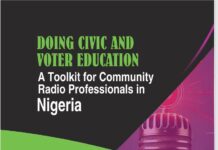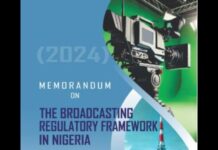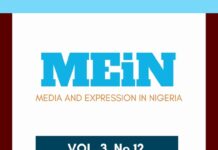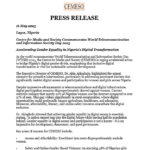The challenges of electoral misinformation, inadequate political accountability, and persistent gaps in inclusion and gender equality are increasingly undermining the integrity of democratic processes. As these issues intensify, the need for credible and transparent elections has never been more urgent. A critical factor in addressing these challenges is the role the media can play because of its capacity to shape public opinion and influence voter behaviour.
With the growing prominence of digital media, its impact on elections has also become even more significant. By fostering informed public discourse and promoting transparency, the media can play a pivotal role in ensuring fair, inclusive, and accountable electoral processes, restoring trust and stability in democracy.
A critical meeting of minds
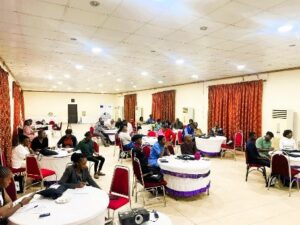
Against the above background, the International Press Centre (IPC) and the Centre for Media and Society (CEMESO) as implementing partners of Component 4: Support to Media of the European Union Support to Democratic Governance Project Phase Two (EU-SDGNII), organised series of critical engagements in Akure, from September 10 to 13, 2024, prior to the Ondo State off-cycle governorship election. The engagements served as platforms for fostering collaboration and strengthening the role of the media in promoting credible and transparent elections.
Bringing together a diverse group of media professionals (both print and online), election officials, and civil society representatives, the “Media and Election Stakeholders Dialogue” was organised in partnership with the Nigerian Association of Women Journalists (NAWOJ) and the Nigeria Union of Journalists (NUJ), Ondo State chapter. The focus of the dialogue was to ensure that media practitioners and election stakeholders uphold accountability and responsibility in their roles.
The event included a series of insightful presentations by resource persons and technical brainstorming sessions, all aimed at addressing the complex and multifaceted challenges that today’s elections face.
The impact of Print and Online Media
A key issue discussed during the dialogue focused on the role of media in setting the agenda for a renewed partnership aimed at improving democracy in Ondo State, particularly in relation to the upcoming off-cycle election. This session was facilitated by Dr. Tunde Fajimbola, a lecturer in the Department of International Relations at Elizade University.
Dr. Fajimbola underscored the media’s crucial role in informing the electorate about the foundational purpose of government and its responsibilities. He asserted that the media must educate the public on the government’s essential functions: preserving life, protecting property, providing public goods, and promoting equality. It was highlighted that this understanding is vital for voters as they evaluate candidates’ promises and platforms, enabling them to make informed decisions that reflect the true role of government in society.
Media’s Influence on Public Opinion During Elections
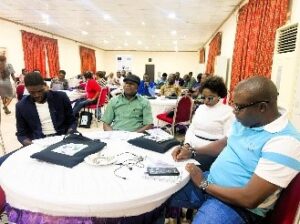
A significant part of the dialogue explored the ways in which media influences voter perceptions and behaviour, highlighting its role in the broader democratic process.
In a standout session titled “Informing the Electorate: Key Considerations for Ondo Governorship Elections,” Dr. Fajimbola spoke candidly about the important issues voters should consider when making informed decisions. He noted that the media can guide public decision-making by providing reports that focus on candidates’ plans for key issues.
As an example, he suggested that the media should provide in-depth coverage of candidates’ strategies for developing infrastructure, particularly at the grassroots level, fostering industrialization, achieving economic growth, ensuring security, and creating jobs.
Dr. Fajimbola also stressed the importance of the media focusing on candidates’ plans to improve essential sectors like education, healthcare, housing, food security, youth development, tourism, and sports. He added that by presenting voters with a clear understanding of each candidate’s policies, the media can help create a more informed and active electorate.
The Media’s Role in Electoral Reporting: Emphasising Issue-Based Coverage
The training underscored the importance of adhering to the highest standards of electoral reporting, with a strong emphasis on credibility and responsibility. The speaker highlighted that the media must prioritize fact-checking and source verification, avoid speculation and rumours, and ensure balanced coverage of all candidates and parties.
A key aspect of the training was the importance of issue-based reporting. It was stressed that the media should focus on policy debates and discussions, analysing candidates’ manifestoes and track records. The media should explore how proposed policies will impact various demographics and communities, providing in-depth analysis of critical electoral issues. This approach allows voters to make well-informed decisions based on substantial policy discussions rather than political rhetoric.
Gender-Friendly Reporting Practices: Promoting Inclusive and Equal Coverage
The session also focused on the need for inclusive reporting, urging the media to represent a diverse range of voices and perspectives. It was emphasised that media outlets should ensure fair representation of all candidates and parties, paying particular attention to underrepresented issues and marginalized communities. This ensures that the electorate is provided with a comprehensive understanding of all viewpoints and concerns.
Another important takeaway from the dialogue was the need for gender-sensitive reporting practices. The session emphasized the importance of avoiding gender bias and stereotypes in election coverage. It called for a greater focus on women’s issues and perspectives, and for equal representation of female candidates and voices in electoral reporting. By promoting gender-inclusive practices, the media can contribute to a more equitable and fair electoral process.
Challenges to Issue-Based Reporting: Early Warning Checklist
The speaker emphasised the significant challenges that media outlets face in covering elections, including limited resources, restricted access to information, political interference, misinformation, threats to personal safety, and intimidation. These factors create substantial barriers to effective media coverage, which is essential for a healthy democratic process.
He urged media professionals to remain vigilant for early warning signs that could compromise issue-based reporting during elections. Such signs may detract from the core democratic values, fostering a negative media environment that distracts from substantive discussions about election issues.
The discussion underscored that electoral manipulation frequently results in allegations of voter registration fraud and other deceptive practices, which can compromise the integrity of electoral processes. Additionally, it was noted that journalists should closely monitor key indicators, such as increasing tensions and instances of violence, which may manifest as physical confrontations, assaults on political opponents, and the vandalism of campaign materials.
Journalists were advised to exercise caution and avoid using divisive rhetoric in their reporting. This includes refraining from inflammatory language and political hate speech that may be propagated by political leaders or their supporters.
In the context of misinformation, participants were encouraged to be vigilant against the spread of false narratives and propaganda, particularly on social media platforms. Such misinformation campaigns can significantly influence voter perceptions and may even incite violence.
Additionally, the challenges of political disputes were brought to light, as they can result in internal conflicts within political parties, leading to splintering and defections. Efforts to suppress voter turnout—targeting specific demographic groups through intimidation and other tactics—further complicate the electoral landscape and hinder comprehensive media coverage.
The session also explored the agenda-setting theory in electoral journalism, which examines how media coverage can shape public perceptions of key election issues. By highlighting specific topics, the media can influence what the public deems important to follow and discuss during the electoral period.
Overall, the discussion underscored the critical role of the media in fostering an informed electorate and maintaining the integrity of democratic processes, while also acknowledging the numerous obstacles they face in fulfilling this responsibility.
Through the discussion, it was revealed that electoral manipulation frequently results in allegations of voter registration fraud and other deceptive practices, which can compromise the integrity of electoral processes. Additionally, it was noted that journalists should closely monitor key indicators, such as increasing tensions and instances of violence, which may manifest as physical confrontations, assaults on political opponents, and the vandalism of campaign materials.
Best Practices
The session highlighted several best practices for journalists covering electoral processes and elections. These include collaborating with fact-checking organisations, engaging with audiences to encourage feedback, providing voter education, and explaining electoral procedures. Additionally, journalists should support investigative journalism and factually accurate reporting to promote a more informed electorate, foster democratic engagement, and contribute to a peaceful and credible electoral process.
Furthermore, the session facilitator led participants in a group exercise aimed at applying media dialogue theory to shape social narratives and influence public discourse. Journalists shared their experiences and strategies for navigating the complexities of the modern media landscape.
Pursuing Truth, Promoting Integrity, and Empowering Voters
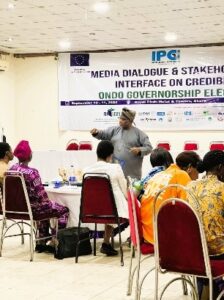
Taiwo Obe, Founder and Director of the Journalism Clinic, emphasised that the core of journalism is rooted in the pursuit of answers to significant questions and the relentless examination of those answers until every query is satisfactorily addressed. He compared questions to the vital lubricant that journalists must use to effectively drive their electoral reporting.
Obe urged election journalists to expand their focus beyond simply reporting breaking news. He advocated for more thorough and nuanced reporting that explores the underlying issues influencing the electoral process, such as voter education, the integrity of electoral systems, and the accountability of candidates and officials. This approach will enable journalists to provide the public with a deeper understanding of the complexities involved, thereby empowering voters to make informed decisions.
Furthermore, Obe highlighted the imperative for journalists to maintain impartiality and diligence, ensuring that their reporting is not only accurate but also fair. He called on media practitioners to prioritize integrity and truth, particularly during election periods when misinformation can easily distort public perception. In doing so, the media can become a reliable source of trust, upholding democratic values and equipping citizens with the essential information needed to make informed choices at the polls.
In conclusion, Obe encouraged journalists to embrace innovation and adapt to the evolving media landscape. By leveraging new tools and platforms, they can engage broader audiences and foster meaningful dialogue about the future of their communities and nations.
Issues in Statutory Regulatory Framework for Broadcasting During the Electoral Process
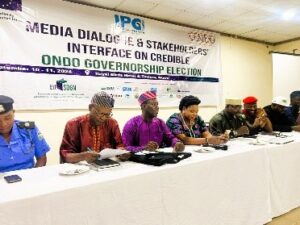 In a separate segment aimed at ensuring the media plays its role effectively in the electoral process, CEMESO engaged with journalists from the broadcast sector, including radio and television, to delve into the regulatory framework governing broadcast media during elections. This session, facilitated by Dr. Akin Akingbulu, the Executive Director of CEMESO, provided key insights into the legal provisions and obligations for broadcast media during elections.
In a separate segment aimed at ensuring the media plays its role effectively in the electoral process, CEMESO engaged with journalists from the broadcast sector, including radio and television, to delve into the regulatory framework governing broadcast media during elections. This session, facilitated by Dr. Akin Akingbulu, the Executive Director of CEMESO, provided key insights into the legal provisions and obligations for broadcast media during elections.
Key Provisions of the Regulatory Framework
Dr. Akingbulu outlined critical aspects of the regulatory framework, highlighting relevant sections of the Nigeria Broadcasting Code (NBC) (6th Edition, 2019), its Addendum (2020), and the Electoral Act 2022. He stressed the necessity for journalists and broadcasters to familiarise themselves with these provisions to ensure compliance and uphold the integrity of the electoral process.
Campaign Period and Termination of Campaigns
A key point discussed was the termination of campaigns as outlined in Section 94 of the Electoral Act, which dictates that political parties’ campaigns can only begin 150 days before the election and must end 24 hours prior to the polling day. Dr. Akingbulu pointed out that any breach of the 24-hour silence period would incur a penalty of N500,000. This provision ensures that the media is not overwhelmed by last-minute political advertisements or speeches that could influence voter behaviour too close to voting day.
Equal Airtime Allocation for Political Parties and Candidates.
Dr. Akingbulu also highlighted Section 95 of the Electoral Act, which mandates that airtime on public electronic media must be allocated equally to all political parties and candidates during prime times at similar hours of the day. This ensures fairness in media coverage, preventing any party or candidate from receiving disproportionate media attention. He noted that breaching this provision would attract substantial penalties, such as N2 million for a first offense and N5 million for subsequent offenses. Additionally, principal officers or staff involved could face fines of N1 million- or 6-months imprisonment.
Restrictions on Broadcasting Near Polling Day
The discussion also touched on Section 96 of the Electoral Act, which imposes penalties for broadcasting content that promotes or opposes a party or candidate within 24 hours of polling day. For corporate bodies, the penalty is a N1 million fine, while individuals face N1 million fines or 6 months imprisonment, or both. This provision is intended to limit the influence of media outlets during the critical final hours before voters head to the polls.
Challenges of Interpretation and Implementation
The session further delved into how broadcasters interpret and implement these provisions. There were discussions about the challenges faced by media houses in complying with these regulations, especially when dealing with political pressures and possible regulatory actions. Dr. Akingbulu outlined lessons from previous electoral cycles, emphasising the need for broadcasters to be cautious and proactive in adhering to the legal framework to avoid penalties and ensure a free, fair, and transparent election coverage.
The discussions stressed the importance of ensuring media coverage that is both fair and responsible during elections. It was clear that broadcasters need to be well-versed in the regulations that govern their activities, particularly in the context of campaign periods, equal airtime allocation, and the restriction of political promotion close to polling days. The session served as a crucial reminder for media houses to uphold the highest standards of professionalism and integrity during the electoral process.
Guidelines for Electoral Coverage
In an additional session dedicated to ensuring proper and responsible electoral reporting, the focus shifted to the Nigeria Media Code of Election Coverage. This code sets out crucial guidelines for media professionals, with the aim of guiding them through the complexities of electoral reporting while maintaining high ethical standards.
The session underlined that creating an enabling environment for media to perform its duties during electoral processes is a collective responsibility. Government institutions, Law Enforcement and Security Agencies, Political Parties, Election Management Bodies, and Civil Society Organizations are all expected to play a role in ensuring that media professionals can work freely and effectively.
Key Provisions of the Media Code
Mr. Lanre Arogundade, the Executive Director of the International Press Centre (IPC), facilitated this session, underscoring the importance of compliance with the Nigeria Media Code of Election Coverage. He explained that adherence to these guidelines would significantly enhance the quality and integrity of election journalism in the country.
The key provisions of the Media Code were discussed in detail, focusing on several critical areas:
1. Access to Information: Journalists must be able to access relevant and timely information to report on the election process. The code calls for transparency and openness from all stakeholders involved in elections.
2. Professionalism and Social Responsibility: Journalists are expected to cover elections with professionalism, ensuring that their work is accurate, balanced, and fair. The media should be a platform for responsible discourse, free from sensationalism and partisanship.
3. Ethical Conduct: Ethical journalism is crucial in promoting a fair and credible electoral process. The code encourages journalists to adhere to the highest standards of ethics, including accuracy, impartiality, and integrity in their reporting.
4. Hate Speech and Incitement: One of the most critical components of the code is the emphasis on avoiding hate speech and incitement. Journalists are advised to refrain from publishing content that can escalate tensions or incite violence, particularly along political or ethnic lines.
5. Conflict Sensitivity and Awareness: The Media Code encourages journalists to be aware of the potential for conflict during elections. Reporting should avoid aggravating existing tensions and should be sensitive to the diverse social and cultural contexts of the electorate.
6. Monitoring, Implementation, and Enforcement: Compliance with the code is essential for the success of electoral coverage. The session emphasised that effective monitoring mechanisms should be put in place to ensure adherence to the guidelines. It is equally important for there to be strict enforcement measures for any violations.
Mr. Arogundade strongly advised journalists, especially those covering the elections, to familiarize themselves with the full text of the Nigeria Media Code of Election Coverage. He noted that understanding and implementing the provisions would not only help ensure credible electoral reporting but also contribute to the overall success of democracy in Nigeria.
In conclusion, the sessions provided valuable insights into the role of the media in ensuring free, fair, and peaceful elections, which the journalists were believed to have substantially put into practise during the governorship election of November 16, 2024.
The events were made possible through funding from the European Union (EU) under EU-SDGNII, the overarching goal of which is to strengthen democratic consolidation in Nigeria by promoting professional and responsible media coverage of elections.


